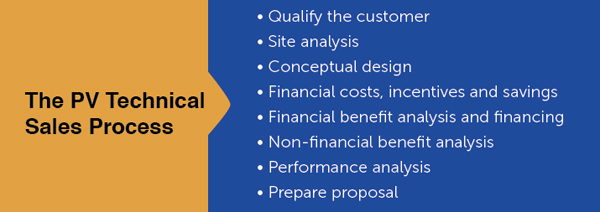By Richard Lawrence, Executive Director
North American Board of Certified Energy Practitioners (NABCEP)
It’s important for solar installers to know their stuff, but a PV technical sales professional also should be one of the most knowledgeable people in the company. Not only does this position require a strong understanding of fundamental technical aspects of PV-system design and installation, but also knowledge of a variety of complex and ever-evolving financial matters. There’s a lot of talk about the importance of installer training. But if there is anyone in the company who needs a strong educational background and can benefit the most from ongoing training, it is the PV technical-sales professional.
PV technical sales professionals are almost always the face of an installation company, serving as the primary contact with the customer from initial interest through flipping the switch. These positions need to be filled with people able to explain the variety of technical and financial options available in an efficient (yet meaningful) way, and in language a layperson can understand. While the installation crew must certainly know what they are doing — and do it in a professional manner — it doesn’t matter how well the electrician can wire a combiner box if the sales team doesn’t succeed.
One of the most important responsibilities — and often one of the most challenging tasks — PV technical sales professionals face is setting reasonable and realistic expectations for customers. Each client comes to the table with preconceived notions about solar. It is important to understand the customer’s motivations and propose a solution that will meet their needs. Often the potential buyer or lessee is skeptical about the technology’s reliability, cost effectiveness or even aesthetics. It’s up to the sales person to sell the client on the idea. The potential customer may also have overly optimistic expectations. While this might make it easier to sell a system, it may be harder to actually meet their expectations, risking customer satisfaction. For a company to achieve long-term success in the market, it’s critical to ensure that each customer starts out with reasonable expectations for system output and economic performance.
Keeping up with various financial structures of different leasing arrangements, community-ownership models, virtual net-metering options, property-assessed clean energy bonds, feed-in tariffs, renewable-energy credits and power-purchase agreement scenarios is enough to make your head spin. So is understanding the impact of proposed utility-rate cases that can fundamentally shift the economics of solar in service territories. But technical solar-sales professionals must be able to navigate all this. Sales professionals must have a thorough understanding of financial concepts such as internal rate-of-return, net-present value, escalation rates, discount rates and accelerated depreciation. These positions require knowing how to calculate the impact on cash flow from grants vs. loans or getting a rebate instead of a tax credit.
This is why adequate training is so important, both for solar newcomers as well as current solar professionals who need to stay up to date. Technical sales professionals use all the standard technical and fundamental financial concepts covered in basic solar training programs on a day-to-day basis. But ongoing training is necessary for sales professionals to keep up with the changes in the sales process and options available to customers in a rapidly evolving market.
There are many opportunities available for a well-educated PV technical sales professional in today’s solar industry. There are also many opportunities for PV technical sales personnel to create false hopes and black eyes. As the business of solar matures and tries out new ideas, the need for technical-sales training grows exponentially. Talented, certified PV-technical-sales professionals can help avoid the mistakes of the past and put solar on track for sustainable growth in the future.







Where can they go to get a trainning?
Yes, can be very frustrating going up against competitors who have put untrained inexperienced sales people into the field. Thanks for highlighting this
I could not agree more. It is unfortunate that there are many sales personnel who are not nearly as educated as they should be, and do not recognize the need.